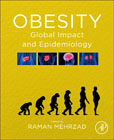
Obesity continues to accelerate resulting in an unprecedented epidemic that shows no significant signs of slowing down any time soon. The World Health Organization reports that in 2016, nearly 2 billion adults were overweight and that worldwide obesity has nearly tripled since 1975. Obesity: Global Impact and Epidemiology is an important tool in proving a link to new knowledge, serving researchers and clinicians. The field of obesity is evolving very quickly and there is an abundance of scientific data that has emerged and is emerging constantly. Researchers and physicians need new updated information about the epidemiology and global impact of obesity that come from authors that have a wide perspective in the field. For health professionals and researchers, there is a need to understand how obesity begins. While a simple question, the answer is very complex. Serves as a starting point for in-depth discussions in academic settings, leading to revised and updated treatment options for practicing obesity-treatment specialistsOffers practical information about the methodology of epidemiologic studies of obesityUpdated important source of information for clinicians and scientists in the field of obesity INDICE: 1. Introduction2. Definition of Obesity3. Analytic epidemiology designs in obesity research4. Prevalence and trends in obesity in the US5. Prevalence and trends in obesity in affluent countries6. Global impact of obesity7. The health impact of obesity8. Psychosocial issues of obesity9. The role of diet in the obesity epidemic10. The role of physical activity in the obesity epidemic11. Environmental factors related to the obesity epidemic12. Cultural factors related to the obesity epidemic13. Educational factors related to the obesity epidemic14. Refined food addiction and its relation to obesity15. Glycemic index16. Predictors of obesity
- ISBN: 978-0-12-818839-2
- Editorial: Elsevier
- Encuadernacion: Rústica
- Páginas: 400
- Fecha Publicación: 01/09/2020
- Nº Volúmenes: 1
- Idioma: Inglés
